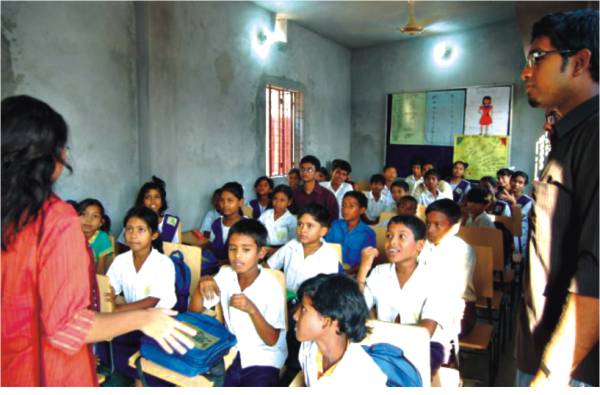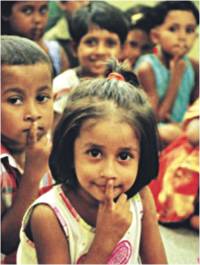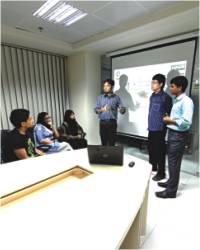Spotlight

'Language' is a conduit of knowledge
that one needs to explore, and
not consider just another subject that needs to be passed. Photo: Kazi Tahsin Agaz Apurbo
Promiti Prova Chowdhury
Nowshin (not her real name) is an A Level candidate. Though she can read Bangla, she cannot write it properly. The subject 'Bangla' was included in her school curriculum from class one up to O level. Then how come a grown up citizen like her who had been privileged enough to receive education from one of the renowned schools of the country cannot write in her mother language at this stage? She claims, “For getting a firm hold of a language one has to study the grammar and literatures of it. I never liked the subject Bangla. I didn't get the instinct to do well in this subject, neither from school nor from family, but just had it for the sake of passing. I was kind of scared of it.” When asked why she was so ignorant about studying the subject, she said, “Grammar is boring and monotonous part of studying any language. But it is the core tool for getting a good grip of the language. I had Bangla from class one, whereas English was taught from KG 1. English Grammar was introduced in class one, while for Bangla, grammar was introduced all of a sudden in class seven. Already I was scared of the subject. Such curriculum made it more uninteresting to me.”

Interactions in classrooms should be done in English during the English language classes. Photo: Star
This was the situation ten years back. So today, what is the level of Bangla education that the toddlers are getting provided with in the English medium schools? Radiant Reading, Spelling Books, Complete English, Fun with Grammar while these four books are used for teaching English in class one at most of the first rank English medium schools around the country, 'Shonamonir Bangla pora' is the only book for teaching Bangla, the mother tongue. Munif (not his real name) is a student of class one at SFX Greenherald International School. While he is able to construct fine sentences in English, faces hard times in reading and writing Bangla. Because he still cannot identify Bangla letters. His guardian points out the incoherent planning of syllabus as responsible for such state. “All my three children are studying in Greenherald. My oldest son, who is an O Level candidate now, had 'Bangla' in class 1, while English was taught from play group. Now my youngest son got Bangla from KG 2, but situation has improved little. For the first half of the year, only 'shoroborno' (vowels) was taught and suddenly from the second term rhymes are included in the syllabus. Now how can my son read out the rhymes without practicing the 'banjonborno' (consonants)? I can make him memorise the rhymes, but that doesn't make him literate in Bangla.”

Many students from Bangla medium find it hard to cope with the English curriculum used for higher studies. Photo: Star
While in English mediums students are being deprived from quality Bangla education, the Bangla mediums are no different in terms of providing quality English education. Farzina (not her real name), an SSC candidate from Lalmatia Girl's School is anxious about the English exam.
Though she is taking coaching in English, no significant improvements are being made. “It is a foreign language. We don't feel the interest of learning it. Nobody talks in English in school, not even the English teachers. There is no story book in English as we have in Bangla. The two books for paper two-'Advanced Learner's Communicative English Grammar and Composition' and 'A Potential English Grammar and Composition' are full of Bangla instructions. The definitions are written in a mixture of English and Bangla,” states Farzina.
| |
 |
| |
Children deserve quality education on the mother tongue and the international language. Photo: Jaago Foundation |
Sadat (not his real name) and Asfia (not her real name) are siblings studying in Saint Joseph Higher Secondary School and Holly Cross Girl's High School respectively, the two esteemed Bangla medium schools of the country. They point out private coaching and practice outside school to be the reason of their being a little better in English compared to other students. But they are not efficient in speaking because the teachers do not speak in English or compel them to speak in English during the English classes.
So what happens to those who cannot afford coaching? Shohagi, daughter of a domestic worker was about to get promoted to class three at Isdail School, a government run primary school at Narayanganj providing free education to underprivileged kids. But for five marks she failed in English, so again she has to stay in class two. Her mother, very likely is unable to afford any extra aid outside school for her child's education.
Novaira is a student of first semester in Architectural Engineering at Ahsanullah University of Science and Technology. After passing SSC from Norshingdi Shahbuddin Memorial Academy and HSC from Mirpur Ideal College, she finds it really hard to communicate and study in English at university. “Everything was suggestion based in school and college level. Teachers used to make list of important model comprehensions, word meanings, letters, essays etc. We used to memorise them for the sake of passing. No language can be learnt in such narrowed down way. As a result today I am one of the worst sufferers. My semester is passing in learning the new terms in English, let alone the actual contents.” She believes that Bangla medium schools teach English just to increase the pass rates. There are many GPA 5 holders who cannot speak or write English proficiently. She opines that during HSC level if some of the subjects are taught in English then many students will find it less traumatising after reaching university level.
 |
|
One faces hard times while giving presentations due to lack of spoken practices at school level. Photo: Kazi Tahsin Agaz Apurbo |
|
Same thing is happening to Saiful Islam, who is a freshman in Business Administration at Independent University Bangladesh. Coming from Junior Laboratory School and then Imperial College, he feels there had been no practice of English other than the suggested materials by teachers. As a result they have passed in English but now facing tremendous difficulties in catching lectures at university.
Pritomi (not her real name), an ex student of Viqarunnisa Noon School and College (national curriculum) who is currently pursuing higher education at USA shares, “I found Bangla as boring as English. I am afraid my boredom has little to do with the languages themselves, but more to do with how they were taught. Whatever I have read of the rich Bangla and English literature, I did so by myself in the privacy and familiarity of my home. Being in English medium made little difference for me as all the HSC books were in Bangla. I had to translate every book myself to English during weekends. At the SSC level, most teachers taught and conversed in Bangla. The fact that the textbooks were written in English made little difference to me. I am of course as efficient in Bangla as any average Bangladeshi. I do not understand why student who has studied in an English medium school has to even face the question of whether s/he is proficient in Bangla. They are Bangladeshis living in a Bangali society. By studying in English my whole life, perhaps gives me the added benefit of knowing another language--it does not take way or negate any proficiency of language skill in Bangla.”

The students of English mediums have difficulty in writing Bangla and vice versa. Photo: Star
Pritomi feels that true learning does not occur by memorising answers to literature questions or tit-bits of literature books for answering MCQs in the board exam. “I realised at an early age that I needed to find another way to study so the beautiful words printed so simplistically in the text books can resonate with me and enrich my living experience and how I see the world. However, accent does not matter to me at all. I have a hint of accent in my spoken English as well. On the other hand, I think it marks your ethnic and national identity--something I am very proud of,” exclaims Pritomi.
Like every year the month of February and International Mother Language Day has arrived. Like every year we will pay homage to our language martyrs and feel proud that on this very day rest of the world is also revering their mother languages. But what needs to be done first and foremost is to bring the whole nation under a proportionate curriculum where Bangla and English both will be practiced substantially. English, the language that will help one to become a global citizen and Bangla, the language for which we have fought for and for which we have achieved whatever we have today.

Photo: Star
| 